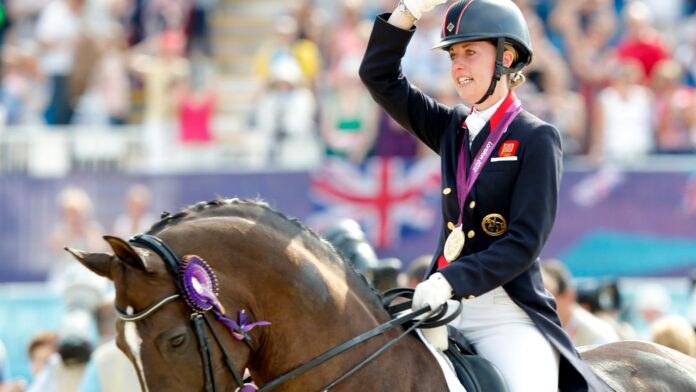A video of dressage Olympian Charlotte Dujardin whipping a horse’s legs during a training session has prompted questions over the future of equestrian sports.
Animal rights group PETA renewed its call for equestrian sports to be banned from the Olympics, saying “horses don’t volunteer – they can only submit to violence and coercion”.
Dujardin was suspended by the world governing body – the International Federation for Equestrian Sports (FEI) – and pulled out of the Paris Olympics.
She said the footage “shows me making an error of judgement” and claimed what happened was “completely out of character” and “does not reflect how I train my horses or coach my pupils”.
Is dressage a sport that can benefit both horse and rider – or is abuse inevitable?
Sky News speaks to an animals rights organisation and the dressage community on both sides of the argument.
‘Money and medals make abuse inevitable’
Using horses for sport is incompatible with animal welfare, Claire Bass, senior director of campaigns and public affairs at Humane Society International, argues.
“When you have an industry that’s focused on money or winning medals or prizes or acclaim, unfortunately there’ll always be some people who will go to extremes, including animal abuse, in order to secure that victory,” she tells Sky News.
“I think it requires us to examine whether there is an ongoing social licence for an equine so-called sport like this to continue if we really value the animal’s welfare.
“The dressage industry prides itself on saying dressage is all about harmony between the rider and the animal, and that the horses perform these dances and behaviours because of that harmony.”
But, she says, the video of Dujardin “makes an absolute mockery and undermines that, because the horse is being told that if it doesn’t perform, it gets hurt”.
Ms Bass points out this isn’t the first video to emerge of abuse in dressage, while horse racing faces regular calls to be banned and scenes of abuse during the Tokyo Olympics modern pentathlon competition forced a change to the horseriding element in future competitions.
The FEI suspended Colombian dressage competitor Cesar Parra over videos showing alleged animal abuse earlier this year.
Danish rider Carina Cassoe Kruth was forced to withdraw from the Olympics and faces disciplinary proceedings from the national equestrian body over similar allegations, and last year an undercover documentary revealed what the Danish Riding Instructor Association called “systematic violent riding” at a prestigious dressage stable in Denmark.
“All the industry bodies have written countless letters saying we don’t agree with this, we’ve got to clean up our act – and yet they keep happening,” Ms Bass says.
Various practices have been banned “but their use persists”, which she argues shows industry guidelines are not enough to protect animals.
“It’s not true to say that everyone involved in dressage or any kind of equine sport is practising cruelty.
“But sadly, it’s all too often the case that [the horses] are suffering. And therefore, we’ve got to question the future of the industry.
“It comes down to money. If you can make money or sponsorship by winning medals and competitions, that’s the driver and that’s completely at odds with animal welfare.”
Read more:
Charlotte Dujardin horse training controversy explained
Video shows Charlotte Dujardin whipping horse in training session
👉 Click to subscribe to the Sky News Daily wherever you get your podcasts 👈
‘Keeping dressage in the Olympics shows best of horse-rider relationship’
Having dressage at the Olympics is a chance to “showcase the harmonious relationship between horse and rider”, Jason Brautigam, chief executive of British Dressage, tells Sky News.
“The word dressage literally means ‘to train’,” he says.
“Our mission is to ‘bring people and horses together in harmony’ and a central part of this is promoting the correct methods for training horses.
“Riders should train horses with the objective of developing a happy, healthy athlete.
“This is achieved through harmonious education, by establishing a confident and secure relationship that is based on mutual respect, care, and understanding.”
He adds: “There is no justification for using training methods that are abusive, cause fear or inflict pain.”
British Dressage is the national governing body for the sport and Mr Brautigam says “we aim to uphold the highest standards of horse care and wellbeing”.
The body has imposed a provisional suspension on Dujardin from all national and international competitions pending the outcome of the FEI investigation.
“We have robust equine welfare policies in place, including our Members’ Code of Conduct and Charter for the Horse and take a zero-tolerance approach to any breaches of our rules,” Mr Brautigam said.
“Our members, across all these roles, love their horses, that is what bonds us as a community.
“We hope that they will be able to continue enjoying the sport, with equine welfare and wellbeing at the heart of all activity, for many years to come.”


